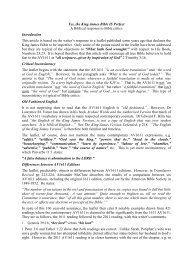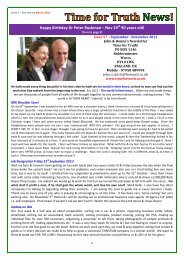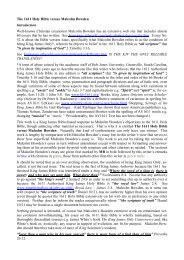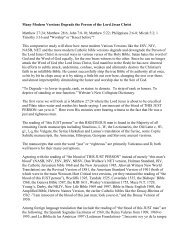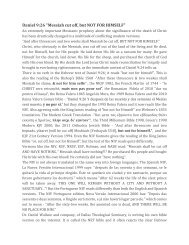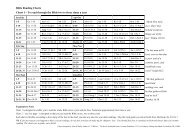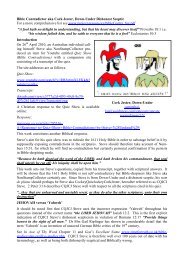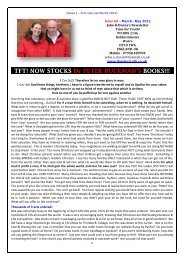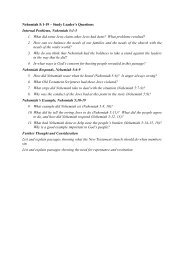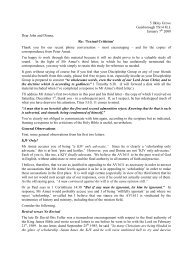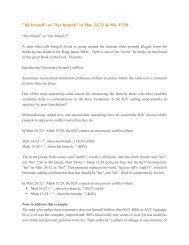A Grievous Wolf - Time for Truth
A Grievous Wolf - Time for Truth
A Grievous Wolf - Time for Truth
Create successful ePaper yourself
Turn your PDF publications into a flip-book with our unique Google optimized e-Paper software.
13<br />
bers 21:6 that “bit the people; and much people of Israel died.” Actual flying serpents do exist in parts<br />
of India, Sri Lanka and Southeast Asia but are said to be harmless to humans and of course are not<br />
“fiery.”<br />
See news.nationalgeographic.com/news/2002/08/0807_020807_flyingsnake.html.<br />
Those flying serpents obviously cannot be cockatrices, which clearly have a supernatural counterpart to<br />
their natural species.<br />
<strong>Grievous</strong> <strong>Wolf</strong> should take careful note that the fiery and most likely flying cockatrices “bit the people”<br />
that “spake against God, and against Moses” Numbers 21:5, 6, both of whom are inextricably associated<br />
with “the book of the law of God” Joshua 24:26, which today cannot be any non-extant Hebrew<br />
‘original.’<br />
Concerning the term “satyr,” it occurs twice in the 1611 Holy Bible, each time in the plural.<br />
“But wild beasts of the desert shall lie there; and their houses shall be full of doleful creatures; and<br />
owls shall dwell there, and satyrs shall dance there” Isaiah 13:21.<br />
“The wild beasts of the desert shall also meet with the wild beasts of the island, and the satyr shall cry<br />
to his fellow; the screech owl also shall rest there, and find <strong>for</strong> herself a place of rest” Isaiah 34:14.<br />
If the King’s men had wanted to use the term “wild goat” instead of “satyr,” they could have done so.<br />
See Deuteronomy 14:5, 1 Samuel 24:2, Job 39:1, Psalm 104:18. Note in passing that Deuteronomy<br />
14:5 includes the only reference in scripture to “the wild ox.” This reference is significant with respect<br />
to the term “unicorn” that will be discussed below.<br />
That the King’s men did not substitute the term “wild goat” <strong>for</strong> “satyr” indicates that God guided them<br />
to bring <strong>for</strong>th more revelation about “satyrs.”<br />
Isaiah 13:21, 34:14 indicate that satyrs are associated with owls, which are unclean birds and there<strong>for</strong>e<br />
satyrs are associated with “devils” Revelation 18:1-2. See Question 17.<br />
Satyrs are also associated with “wild beasts,” in particular “wild beasts of the desert” that are mentioned<br />
in both Isaiah 13:21 and Isaiah 34:14.<br />
Note also Isaiah 13:22, showing that satyrs are associated with “dragons.”<br />
“And the wild beasts of the islands shall cry in their desolate houses, and dragons in their pleasant<br />
palaces: and her time is near to come, and her days shall not be prolonged.”<br />
Five creatures are said to be “wild” in scripture; “the wild goat...the wild ox” Deuteronomy 14:5, the<br />
“wild roe” 2 Samuel 2:18, “the wild ass” Job 6:5, the “wild bull” Isaiah 51:20. As indicated above,<br />
“the wild goat” is mentioned a total of 4 times in scripture, Deuteronomy 14:5, 1 Samuel 24:2, Job<br />
39:1, Psalm 104:18. The wild ox, roe, bull are each mentioned only once.<br />
“The wild ass” in either the singular or plural <strong>for</strong>m, with or without the definite article, is mentioned 11<br />
times in scripture; Job 6:5, 11:2, 24:5, 39:5 twice, Psalm 104:11, Isaiah 32:14, Jeremiah 2:24, 14:6,<br />
Daniel 5:21, Hosea 8:9.<br />
Note in particular the following references.<br />
“Doth the wild ass bray when he hath grass? or loweth the ox over his fodder?” Job 6:5. “The wild<br />
ass” is said to “bray,” which is to cry. Of “the wild beasts” identified in scripture, only the noise of<br />
“the wild ass” is mentioned explicitly.<br />
“For vain man would be wise, though man be born like a wild ass’s colt” Job 11:12. Man is likened<br />
to “a wild ass’s colt.”<br />
“Behold, as wild asses in the desert, go they <strong>for</strong>th to their work; rising betimes <strong>for</strong> a prey: the wilderness<br />
yieldeth food <strong>for</strong> them and <strong>for</strong> their children” Job 24:5. The reference is to men, who are likened<br />
to wild asses.



